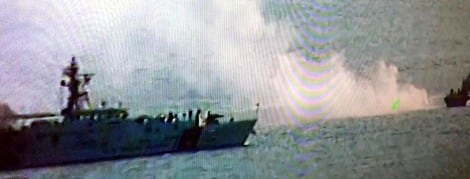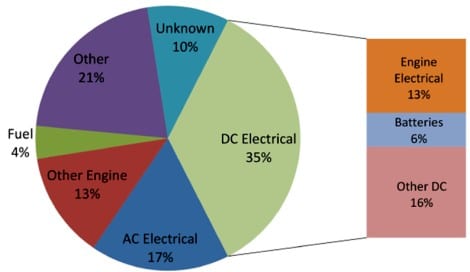 By Bob Currie, Recreational Boating Safety Specialist
By Bob Currie, Recreational Boating Safety Specialist
U. S. Coast Guard Auxiliary Station Galveston Flotilla
Fire in the Houston Ship Channel
The Coast Guard Cutter DANIEL TARR responded to a vessel fire with three people aboard near the Houston Ship Channel entrance Oct. 3, 2020, in Galveston, Texas. The DANIEL TARR crew arrived on scene and began extinguishing the fire alongside the ERIN T, an offshore supply vessel and a good Samaritan safely removed the three passengers from the vessel. Initial reports stated that the fire was caused by a turbocharger fire in the diesel engine. The boat involved burned to the water line. The boat was a 25-foot center console fishing vessel.
The Station Galveston Flotilla of the US Coast Guard Auxiliary operates out of the USCG Station Galveston base on Galveston Island. They aid the Coast Guard by providing maritime observation patrols in Galveston Bay; by providing recreational boating vessel safety checks; and by working alongside Coast Guard members in maritime accident investigation, small boat training, providing a safety zone, Aids to Navigation verification, in the galley, and on the Coast Guard Drone Team.

2019 Recreational Boating Accident Statistics: Fire
The 2019 Recreational Boating Statistics, the latest year for which the Coast Guard has compiled statistics of boating accidents, shows there were 239 recreational boating accidents involving fire in which 277 vessels were involved. There were five deaths, 138 injuries, and damages exceeded $107.5 million. This does not include marina fires involving multiple boats. Although boat fires are not numerous overall, they can be devastating when they happen. Most boat fires can be prevented by routine maintenance and inspection. Many of the mechanical failures attributed to boat fires are due to problems that occur when boats sit for long periods of time and are not exercised enough. Many boat fires are caused by other boats and occur in marinas.
Top Causes of Boat Fires
It takes two things to start a fire: something that will burn and something that will start it burning. We call those two things a fuel source and an ignition source. According to BoatUS, at least half of all boat fires originate around the engine. Often the cause is rooted in DC electrical arcing or wire overheating.

DC Electrical Fires
We are talking about your boat’s electrical system. Your boat uses DC current from batteries to operate. Your battery compartment is the most likely place for a fire to start on a boat with an outboard engine. Boats that have either inboard/outboard or strictly inboard engines tend to have fires in the engine compartment. Surprisingly, fuel fires only account for 4% of boat fires in the study we are using. Electrical arcing and overheating of electrical lines lead the way on DC electrical fires. According to BoatUS, more than half of DC electrical fires, or 19 percent of all fires originating on inboard-powered boats, were associated with either the engine or the batteries, both of which tend to be in the engine compartment. That’s because there are so many things that can burn in the engine compartment — fuel, oil from a slow leak, or even, in the case of a gasoline engine, gas fumes — once a DC wiring problem creates some heat. In addition, starting the engine and charging the batteries generate significantly higher amperages than those in most other areas of the boat. These higher loads create more heat where there are undersized wires, loose or corroded connections, or intermittent shorts.
Finally, the vibration from the engine increases the likelihood of chafe in such vulnerable areas as the wiring harness and connections to the alternator and the starter. Electrical problems can develop over time even if the wiring system was okay in the first place. On the coast we have a high salt content in our air that can corrode even the best connections. There are some products on the market, such as Corrosion X for electrical connections, that can help prevent or slow down corrosion at electrical connections. Frequent inspection of your electrical connections is critical to helping prevent DC electrical fires. When is the last time you checked your battery connections to see that they were tight? Was there a thick layer of corrosion on the terminals? Were any lines showing signs of rubbing through, such as burn marks are thinning of the insulation? Be sure to check the main battery cable connections to the starter. Cranking your engine causes high amperage to go through the lines, and if there is a weak point in your wiring system, it is quite likely to show up when cranking or charging your batteries.
Wiring harnesses and starters account for the majority of DC electrical fires on older boats. If your boat is 25 years or older, consider replacing the wiring harness. Another problem occurs when the battery cables are reversed or hooked up in parallel instead of series at the beginning of the season.
AC Electrical Fires
We are talking about shoreside connections to 120 volts to run your air conditioner, refrigerator, and microwave oven, among other 120 volt appliances. AC electrical fires are likely to take out more than one boat, and if no one is around to call the fire department, an entire marina could be lost.
Shore power is not the only time we use 120 volts AC. Many recreational boaters use trickle chargers to charge their trolling motor batteries. Water intrusion of the electrical connections can cause arcing or line overheating when the batteries are being charged. Be sure to check your connection before plugging in your charging cord. Speaking of battery chargers: never use an automobile battery charger to charge your marine batteries. High-quality marine battery chargers are not only designed for the marine environment with potted components that resist water intrusion, but they also use multi-stage charging regimes and temperature sensors to make sure the batteries get just the right amount of current at each stage of the charging cycle.
Do not use an electrical heater in lieu of proper winterizing. Although it sounds like a good way to keep dampness out when you set your boat up for the winter, you should never operate an electrical heater when no one is aboard. While safer heaters have been developed that are less prone to being tipped over or to igniting anything combustible that falls on them, they still draw a great deal of power, and any corrosion in the shore power system (or worse, household extension cords powering heaters) will tend to build up heat somewhere that can result in a fire.
Engine Overheating Fires
Fifty-six percent of non-electrical engine fires result from failures in the cooling system, while problems in the exhaust system account for another 20 percent. Engines overheat when not enough water circulates to keep the engine at its proper operating temperature. Reduced water flow usually happens for one of three reasons: debris blocks the water intake or sediment enters the cooling system, scale or marine growth restricts water flow in the heat exchanger or hoses, or the water pump ceases to circulate adequate water, most often due to an impeller failure. Impeller failure can result from sediment in the raw water, so it pays to replace your impeller if you know you were running in particularly dirty water. Otherwise, replacing impellers every other year and flushing cooling systems every season will help to prevent these kinds of fires. If your engine overheats, you should do a full investigation to determine the cause. There is no onboard system to automatically fix problems. It is up to you to find and fix overheating problems.
Other Causes of Boat Fires
Boats are different from cars in that boats are subject to constant vibrations and slamming from crossing the waves. While you wouldn’t think of driving your car across a plowed field, you think nothing of running through heavy chop, slamming the hull as you go. Hey- the boat is made for that, right? Well, some are, and some are not. You have to know what your boat is designed to handle, and not operate outside the design limits. Even when you operate within the boat’s design limits, there are constant vibrations that over time cause weakening at all types of connections, including fuel lines, exhausts, and water cooling lines. Problems with those systems can easily lead to a problem that makes a boat fire more likely to occur unless you detect and correct the problem. Some other boat fire causes include:
- Flammable material resting against the exhaust (don’t store those extra life jackets in the engine compartment; yes, I have seen that more than once)
- Fuel line rubs that result in pinhole leaks (you can often only find those when the engine is running and the fuel line is under pressure from the fuel pump)
- Lubrication line leaks near the exhaust
- Leakage of hot gasses from the exhaust
- Collection of carbon dust in the alternator leading to a short
- Engine compartment power vent not venting
- Not using the power ventilator for at least 4 minutes prior to fueling
- Failing to use a backfire preventer on a gasoline inboard or inboard/outboard engine (this is required by law on gasoline engines)
Turbocharger Fires
More and more recreational boaters are powering their boats with turbocharged diesel engines. While diesel engines are the norm on larger boats, there are more options on smaller boats, and lightweight turbocharged diesels are being developed for recreational use. Turbochargers require a different type of maintenance. They need to be cleaned out periodically. They run quite hot compared to a normally aspirated engine, and are subject to buildup in the exhaust, especially if they are routinely operated at lower engine speeds. That turbo needs to be operated at higher engine speeds to help prevent exhaust buildup from unspent fuel and oil. I have quite a bit of experience with diesel engine turbocharger fires. They burn hot and are not easy to extinguish. The key to turbocharger health is routine maintenance to remove buildup. When boost drops below 10% from normal, it is time to clean the turbo. While black exhaust can indicate a problem with your turbocharger, it can also just mean you have dirty filters. Another cause of turbo fires is sticking injectors, which causes unburned fuel to be exhausted through and build up in the turbocharger exhaust nozzle. Mechanical fuel injectors require very clean fuel, and that means you should inspect and change your fuel filters as recommended. A clean engine is a safe engine.
For more information on boating safety, please visit the Official Website of the U.S. Coast Guard’s Boating Safety Division at www.uscgboating.org. Questions about the US Coast Guard Auxiliary or our free Vessel Safety Check program may be directed to me at [email protected]. SAFE BOATING!
[Oct-12-2020]

 Posted in
Posted in 
























